Find Help
More Items From Ergsy search
-

Shoulder subacromial shoulder pain
Relevance: 100%
-
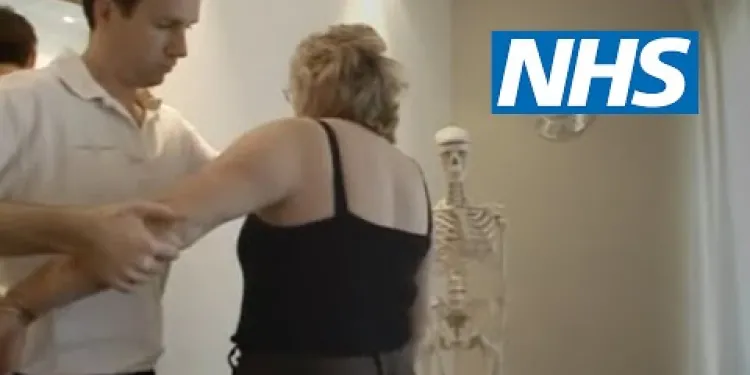
Shoulder pain | NHS
Relevance: 96%
-
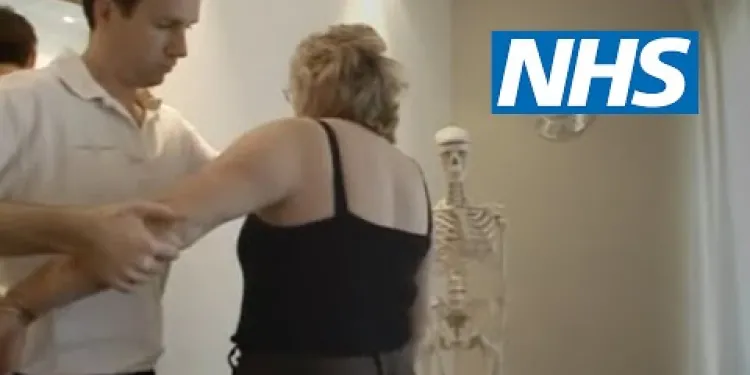
Shoulder pain | NHS
Relevance: 96%
-
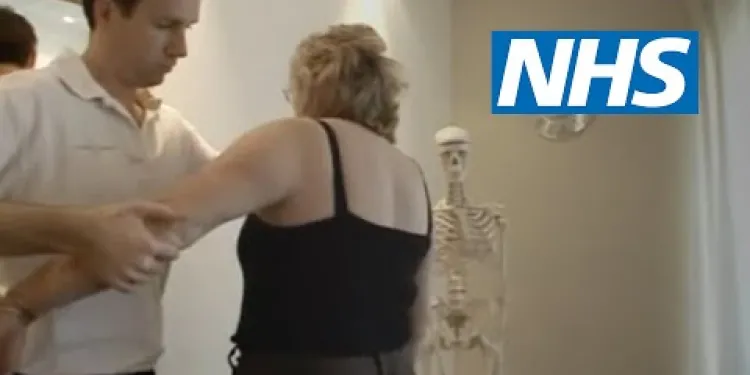
Shoulder pain | NHS
Relevance: 86%
-

Frozen Shoulder Anterior Shoulder Stretch
Relevance: 74%
-
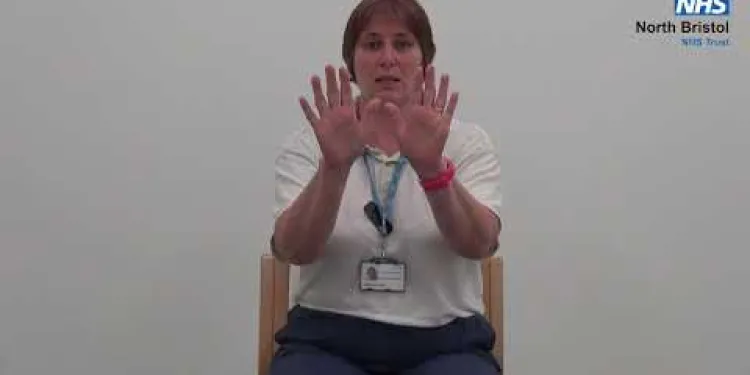
Shoulder Exercises 1
Relevance: 66%
-

Frozen Shoulder Assisted Abduction
Relevance: 66%
-
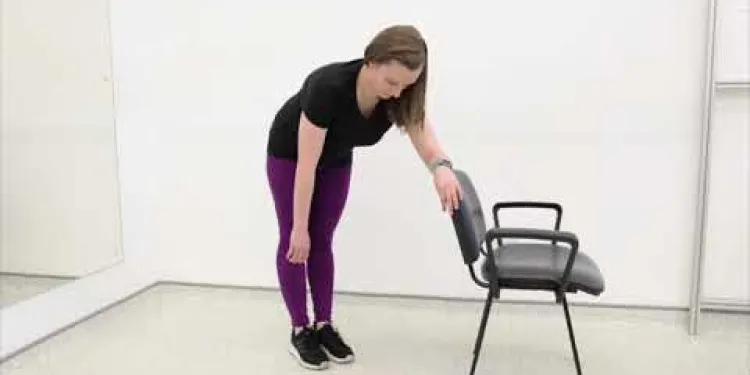
Frozen shoulder Pendular Exercises
Relevance: 66%
-

Frozen Shoulder Scapular Setting
Relevance: 65%
-
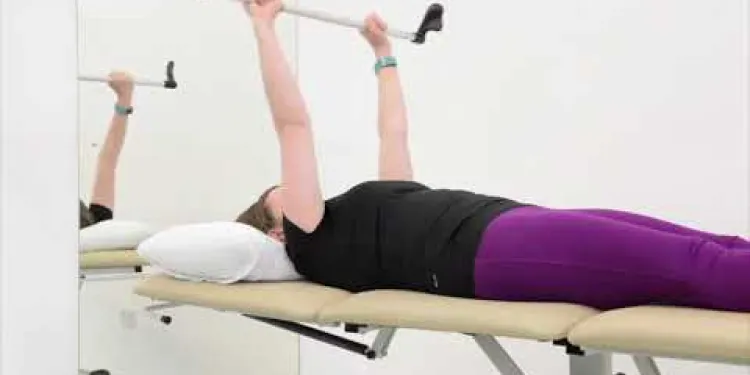
Frozen Shoulder Assisted Flexion
Relevance: 65%
-
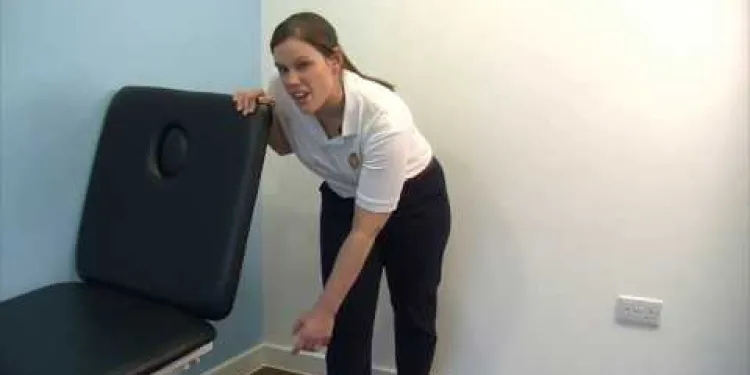
DBTH VFC DISLOCATED SHOULDER
Relevance: 65%
-

Frozen Shoulder Lateral Rotation
Relevance: 65%
-
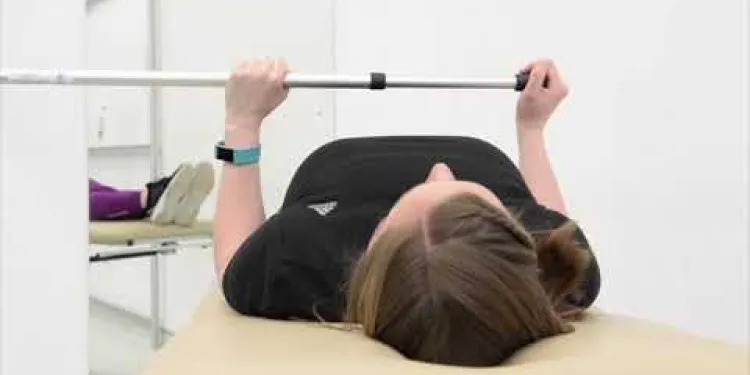
Frozen Shoulder Assisted Lateral Rotation
Relevance: 64%
-

Frozen Shoulder Isometric External Rotation
Relevance: 63%
-

Advice on neck pain and whiplash
Relevance: 47%
-

How do chiropractors treat back pain?
Relevance: 39%
-
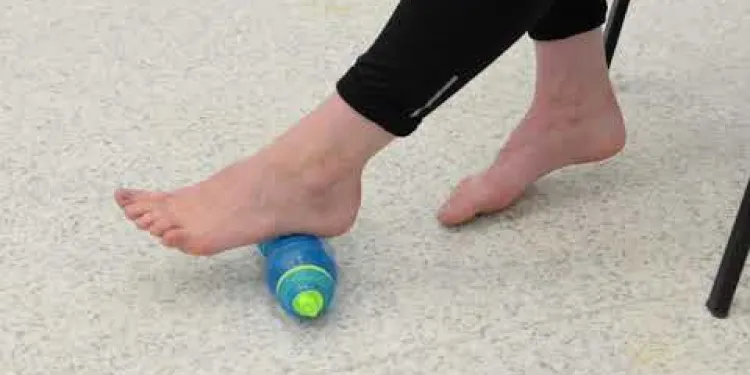
Foot Pain
Relevance: 37%
-

Is impetigo painful?
Relevance: 37%
-

Is a facelift painful?
Relevance: 37%
-

Is a mammogram painful?
Relevance: 37%
-

Heel pain | NHS
Relevance: 35%
-
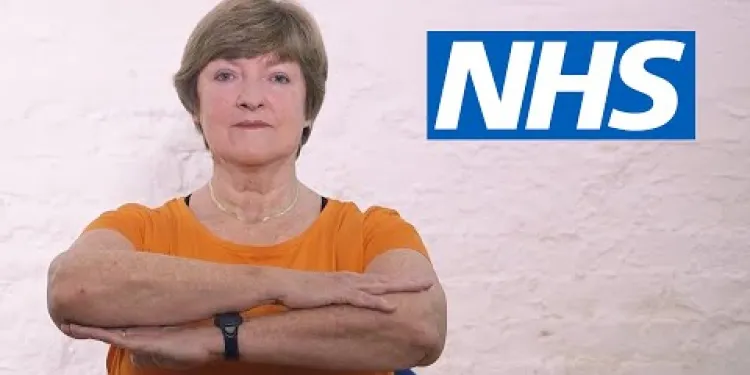
Pilates for back pain: Seated waist twist | NHS
Relevance: 34%
-
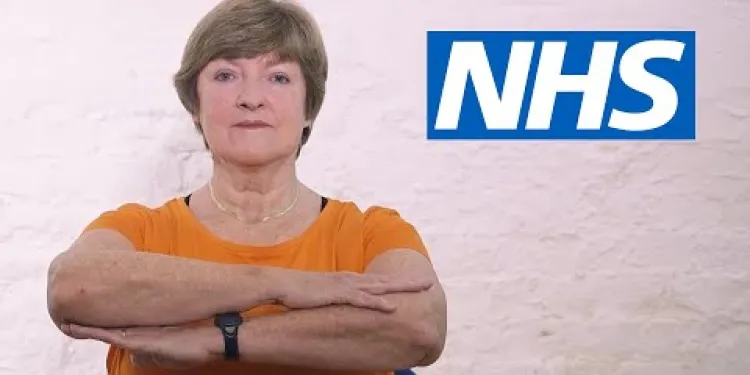
Pilates for back pain: Seated waist twist | NHS
Relevance: 34%
-

Are chiropractic treatments painful?
Relevance: 34%
-

What is the role of pain management in treating whiplash?
Relevance: 34%
-

Mechanical Lower Back Pain
Relevance: 33%
-

Will I feel pain during the procedure?
Relevance: 33%
-

Stomach ache and abdominal pain
Relevance: 33%
-

Period pain (dysmenorrhoea) - BSL
Relevance: 33%
-

Is the womb lining test painful?
Relevance: 32%
-

How to treat back pain | NHS
Relevance: 32%
-

How to deal with period pain | NHS
Relevance: 32%
-

How to deal with period pain | NHS
Relevance: 32%
-

Is a womb lining test painful?
Relevance: 32%
-

How to deal with period pain | NHS
Relevance: 32%
-

How to deal with period pain | NHS
Relevance: 32%
-

Greater trochanteric pain syndrome
Relevance: 31%
-

Can I use Ibuprofen for menstrual pain?
Relevance: 31%
-

How do NSAIDs work to reduce pain?
Relevance: 30%
-

MSK Lower Back Pain information video
Relevance: 30%
Shoulder Pain | NHS
Introduction to Shoulder Pain
Shoulder pain is a common musculoskeletal issue that can affect anyone, regardless of age or activity level. It can be caused by various factors such as injuries, overuse, or underlying medical conditions. The shoulder is a complex joint, and its movements are vital for many daily activities. Understanding the causes, symptoms, and treatments of shoulder pain is essential for effective management and recovery.Common Causes of Shoulder Pain
Shoulder pain can stem from several sources, including:- Rotator Cuff Injuries: Tears or inflammation in the rotator cuff, which consists of muscles and tendons stabilizing the shoulder, are frequent causes of pain.
- Arthritis: Both osteoarthritis and rheumatoid arthritis can lead to shoulder discomfort and stiffness.
- Frozen Shoulder (Adhesive Capsulitis): This condition restricts shoulder movement, causing pain and rigidity over time.
- Bursitis: Inflammation of the bursa, a fluid-filled sac that cushions the shoulder joint, can result in pain.
- Fractures or Dislocations: Physical trauma can lead to fractures or dislocations, significantly impacting shoulder function.
Symptoms of Shoulder Pain
Symptoms can vary depending on the underlying cause but typically include:- Pain that worsens with movement or activity, especially lifting the arm.
- Stiffness and limited range of motion.
- Swelling or tenderness around the shoulder joint.
- Weakness in the shoulder muscles.
- A clicking or popping sensation during shoulder movement.
Treatment Options
Effective management of shoulder pain often involves a combination of treatments, including:- Rest and Activity Modification: Avoiding activities that exacerbate pain can help reduce inflammation.
- Medications: Over-the-counter pain relievers like paracetamol or non-steroidal anti-inflammatory drugs (NSAIDs) can alleviate pain and swelling.
- Physical Therapy: A physiotherapist can design a tailored exercise program to improve strength, flexibility, and mobility.
- Ice and Heat Therapy: Applying ice packs or heat pads can provide temporary relief from pain.
- Steroid Injections: In some cases, corticosteroid injections may be recommended to reduce severe inflammation.
- Surgery: If conservative treatments fail, surgical interventions might be necessary to repair damaged structures.
When to Seek Medical Attention
While mild shoulder pain can often be managed at home, certain situations require prompt medical evaluation:- Severe pain that does not improve with rest or medications.
- Instability or inability to move the shoulder.
- Significant swelling, bruising, or deformity following an injury.
- Numbness, tingling, or weakness in the arm.
Conclusion
Shoulder pain is a prevalent issue that can significantly impact daily life. By understanding the causes, symptoms, and treatments, individuals can take steps to manage their pain effectively. For more information and personalized advice, visit the NHS website or consult with a healthcare provider.Shoulder Pain | NHS
Introduction to Shoulder Pain
Shoulder pain is a common problem that many people experience. Anyone can have shoulder pain, no matter how old they are or what they do. There are many reasons why your shoulder could hurt. It might be because of an injury, using it too much, or other health issues. The shoulder is a very important part of the body because it helps us move our arms. Knowing why your shoulder hurts and how to make it better can help you feel good again.Common Causes of Shoulder Pain
Reasons your shoulder might hurt include:- Rotator Cuff Injuries: This is when the muscles and tendons around your shoulder are hurt or swollen.
- Arthritis: This is when the joints, like the ones in your shoulder, become swollen or stiff.
- Frozen Shoulder: Your shoulder might feel very stiff and hard to move.
- Bursitis: This is when a small, liquid-filled sac in your shoulder gets swollen.
- Fractures or Dislocations: If you hurt your shoulder badly, it might break or move out of place.
Symptoms of Shoulder Pain
How you might feel when your shoulder hurts:- Pain when you move or lift your arm.
- Finding it hard to move your shoulder.
- Your shoulder might be swollen or sore to touch.
- Your shoulder might feel weak.
- It might make a click or pop when you move it.
Treatment Options
How to make your shoulder feel better:- Rest: Stop doing things that hurt your shoulder.
- Medications: You can take medicines like paracetamol to help with the pain.
- Physical Therapy: A therapist can teach you exercises to make your shoulder stronger.
- Ice and Heat: Put ice or a warm pad on your shoulder to make it feel better.
- Steroid Injections: Sometimes, doctors can give you a shot to help with bad swelling.
- Surgery: If nothing else helps, you might need an operation to fix your shoulder.
When to Seek Medical Attention
When to see a doctor:- If the pain is very bad and won't go away.
- If your shoulder feels like it might pop out or you can't move it.
- If it swells up a lot or looks bruised after an injury.
- If your arm feels numb, tingles, or is very weak.
Conclusion
Shoulder pain is common and can stop you from doing things you love. Knowing why your shoulder hurts and how to treat it can help you get better. For more help, visit a doctor or check the NHS website.Frequently Asked Questions
What are common causes of shoulder pain?
Shoulder pain can be caused by a variety of issues such as rotator cuff injuries, tendonitis, bursitis, arthritis, and shoulder impingement.
When should I see a GP for shoulder pain?
You should see a GP if you have severe pain, if the pain does not improve after two weeks of home treatment, or if you notice swelling, redness, or a deformity around the joint.
What home treatments can help alleviate shoulder pain?
Applying an ice pack, taking pain relief medications like ibuprofen or paracetamol, resting the shoulder, and gently exercising to maintain flexibility can help alleviate pain.
Can shoulder pain be a sign of a serious condition?
In some cases, shoulder pain can be a sign of a condition requiring urgent medical attention, such as a heart attack or an injury causing significant structural damage to the shoulder.
What exercises can relieve shoulder pain?
Gentle range-of-motion exercises and strengthening exercises like shoulder rolls, arm circles, and wall push-ups can help relieve shoulder pain.
What are the symptoms of a rotator cuff injury?
Symptoms of a rotator cuff injury include shoulder pain, especially when lifting arms, weakness, and a cracking sensation during movement.
Can poor posture cause shoulder pain?
Yes, poor posture can contribute to shoulder pain by placing extra strain on the shoulder muscles and joints.
How is shoulder pain diagnosed?
Diagnosis often includes a physical examination and may be supported by imaging tests such as X-rays, MRI, or ultrasound scans.
Can physiotherapy help with shoulder pain?
Yes, physiotherapy can be effective in treating shoulder pain through targeted exercises and therapies designed to improve flexibility, strength, and function.
What should I avoid doing if I have shoulder pain?
Avoid activities that worsen the pain, heavy lifting, repetitive overhead movements, and sleeping on the affected shoulder.
How long does it take for shoulder pain to improve?
The recovery time for shoulder pain varies depending on the cause and severity but may take a few weeks to several months.
Is ice or heat better for shoulder pain?
Ice is typically recommended for the first 48 hours to reduce swelling and numb the pain, while heat can be used afterwards to relax muscles and improve blood flow.
Can shoulder pain be prevented?
Maintaining good posture, doing regular shoulder-strengthening exercises, and avoiding overuse can help prevent shoulder pain.
What is frozen shoulder, and what are its symptoms?
Frozen shoulder, or adhesive capsulitis, is a condition where shoulder movement becomes limited and painful. Symptoms include stiffness, reduced range of motion, and persistent pain.
Are there any risks associated with shoulder surgery?
As with any surgery, there are risks including infection, nerve damage, blood clots, and complications from anesthesia, but shoulder surgery is generally safe and complications are uncommon.
What often causes shoulder pain?
Shoulder pain can happen for many reasons. Here are some common causes: - **Injury:** If you hurt your shoulder, it might start to hurt. - **Doing the same thing a lot:** If you move your shoulder the same way again and again, it can hurt. - **Old age:** Sometimes, as people get older, their shoulders might start to hurt. - **Sitting or standing wrong:** If you don't use good posture, your shoulder can feel pain. Try these ways to help with shoulder pain: - **Rest:** Let your shoulder rest if it hurts. - **Ice packs:** Put a cold pack on your shoulder to help with pain. - **See a doctor or therapist:** They can tell you what to do to feel better. Remember to always talk to an adult if you're hurt or in pain!Shoulder pain can happen for different reasons. Some common reasons are:
- A problem with the rotator cuff. This is a group of muscles and tendons in the shoulder.
- Tendonitis. This means the tendons are swollen.
- Bursitis. This means there is swelling in the shoulder joint.
- Arthritis. This is when joints hurt and are stiff.
- Shoulder impingement. This is when something in the shoulder gets pinched.
If you have shoulder pain, you might find it helpful to talk to a doctor. You can also try some simple things like resting your shoulder and using an ice pack to help with swelling. If you find it hard to understand this, asking someone to explain it to you might help.
When should I see a doctor for shoulder pain?
If your shoulder hurts, you might need to see a doctor. Here are some times you should get help:
- If your shoulder pain does not get better after a few days
- If you hurt your shoulder really bad, like from a fall
- If your shoulder looks different, or you can't move it
- If you feel numbness or tingling in your arm
It can help to tell an adult you trust about your shoulder pain. They can help you make an appointment with the doctor. Using pictures or showing how you feel with your hands can help you explain the pain better to the doctor.
Go to the doctor if you have bad pain. Also, see the doctor if your pain doesn't get better after two weeks of taking care of it at home. If you see swelling, redness, or a funny shape around the joint, you should also go to the doctor.
What can I do at home to help my shoulder feel better?
Put an ice pack on it. Take medicine like ibuprofen or paracetamol to help with pain. Rest your shoulder. Move it gently to keep it flexible. This can help the pain go away.
Can shoulder pain mean something is wrong?
Sometimes, shoulder pain can be a sign that something more serious is going on with your health. It is important to listen to your body.
If your shoulder hurts a lot, or if the pain does not go away, ask a doctor to check it.
You can try these things to help understand and explain your pain:
- Write down when the pain started.
- Note what makes the pain better or worse.
- Use simple words to describe the pain, like "sharp" or "dull".
Talking to someone you trust, like a family member or friend, can also help you decide what to do next.
Sometimes, shoulder pain can be a sign of something serious. It might mean you need to see a doctor quickly. This could be because of a heart attack or an injury that has really hurt your shoulder.
Tools or tips to help read better: - Use your finger to follow along the words. - Read out loud to hear the words. - Ask someone to explain words you don’t know.What exercises help shoulder pain?
Doing easy exercises can help if your shoulder hurts. Try gentle movements like rolling your shoulders, making circles with your arms, and pushing against a wall with your hands. These can make your shoulders feel better and stronger.
What happens if you hurt your shoulder?
If you hurt your shoulder, you might feel some of these things:
- Your shoulder might hurt, especially when you move it.
- It might feel weak.
- It could be hard to lift things.
- It might hurt at night and make sleeping hard.
If your shoulder hurts a lot, you should tell an adult. They might take you to see a doctor to help you feel better.
If you hurt your shoulder, you might feel pain. It can hurt when you lift your arm. Your shoulder might feel weak. Sometimes, you might hear a cracking sound when you move it.
Can sitting or standing badly hurt your shoulder?
Yes, sitting or standing in a bad way can make your shoulder hurt. This is because it puts too much pressure on your shoulder muscles and joints.
To help with this, you can:
- Stand or sit up straight.
- Take breaks to stretch.
- Use a chair that supports your back.
- Ask someone to show you good posture.
How do doctors find out why your shoulder hurts?
When your shoulder hurts, doctors try to find out why. They want to help you feel better.
Doctors will:
- Ask you questions about your pain.
- Look at your shoulder and move it gently.
- Sometimes use machines, like X-rays, to see inside your shoulder.
Tools that might help you understand:
- Pictures that show what the doctor does.
- Videos that explain shoulder tests.
Remember, it’s okay to ask the doctor to explain if you don’t understand something. They are there to help you!
Doctors check your body to find out what is wrong. They might use pictures like X-rays, MRI, or ultrasound to help see inside your body.
Can physio help if my shoulder hurts?
Yes, physiotherapy can help with shoulder pain. It uses special exercises and treatments to make the shoulder move better, become stronger, and work well again.
What should I not do if my shoulder hurts?
If your shoulder hurts, here are some things you should not do:
- Don't lift heavy things.
- Don't use your shoulder too much.
- Don't do sports or activities that make the pain worse.
- Don't ignore the pain. Tell a grown-up or a doctor if it keeps hurting.
You can ask for help from an adult or use pictures to understand better. You can also write down things that hurt and show them to a doctor.
Try not to do things that make your pain worse. Don't lift heavy things. Avoid doing the same arm movements over your head again and again. Don't sleep on the shoulder that hurts.
When will shoulder pain feel better?
Getting better after shoulder pain can take different amounts of time. It depends on what’s causing the pain and how bad it is. It might take a few weeks or a few months to feel better.
Should I use ice or heat for shoulder pain?
If your shoulder hurts, you can try ice or heat to feel better.
Use ice if:
- Your shoulder is swollen.
- You had an injury recently, like falling.
Use heat if:
- Your shoulder feels stiff or tight.
- You want to relax your muscles.
Ask an adult to help you choose the right one. Tools like ice packs or warm cloths can be used. Start with 10-15 minutes, then take a break. These might make your shoulder feel better.
When you get hurt, use ice for the first 2 days. This will help stop any swelling and make it hurt less. After 2 days, you can use a warm cloth. This will help your muscles feel relaxed and improve blood flow.
If it's hard to read, try reading with a friend or using a ruler or pen to follow the lines. Listening to the text using a reading app might also help.
Can you stop shoulder pain?
Yes, you can try! Here are some tips:
- Stretch your shoulders often
- Don't carry heavy things
- Use a backpack with two straps
- Sit up straight
- Ask an adult if you need help
You can use things like:
- Warm packs to help muscles relax
- Pillows for support when sitting
Remember, it's okay to ask for help if your shoulder hurts!
Sit or stand up straight to help your shoulders. Do easy exercises to make your shoulders strong. Don't use your shoulders too much. This can stop them from hurting.
What is frozen shoulder, and what are its symptoms?
Frozen shoulder is when your shoulder hurts and is stiff. It is hard to move your arm.
These are the symptoms:
- Your shoulder hurts.
- It is hard to move your arm.
- Your shoulder feels stiff.
Try using warm pads or ask someone to help you exercise your shoulder.
Frozen shoulder is a problem that makes your shoulder hard to move and hurts a lot. It is also called adhesive capsulitis. If you have a frozen shoulder, your shoulder feels stiff, can't move well, and hurts all the time.
Is shoulder surgery risky?
When you have surgery, there can be problems. These problems can be: getting an infection, hurting a nerve, having blood clots, or issues from the medicine that makes you sleep during the surgery. But shoulder surgery is usually safe and problems don't happen very often.
Useful Links
This website offers general information and is not a substitute for professional advice.
Always seek guidance from qualified professionals.
If you have any medical concerns or need urgent help, contact a healthcare professional or emergency services immediately.
Some of this content was generated with AI assistance. We’ve done our best to keep it accurate, helpful, and human-friendly.
- Ergsy carfully checks the information in the videos we provide here.
- Videos shown by Youtube after a video has completed, have NOT been reviewed by ERGSY.
- To view, click the arrow in centre of video.
- Most of the videos you find here will have subtitles and/or closed captions available.
- You may need to turn these on, and choose your preferred language.
- Go to the video you'd like to watch.
- If closed captions (CC) are available, settings will be visible on the bottom right of the video player.
- To turn on Captions, click settings .
- To turn off Captions, click settings again.
More Items From Ergsy search
-

Shoulder subacromial shoulder pain
Relevance: 100%
-

Shoulder pain | NHS
Relevance: 96%
-

Shoulder pain | NHS
Relevance: 96%
-

Shoulder pain | NHS
Relevance: 86%
-

Frozen Shoulder Anterior Shoulder Stretch
Relevance: 74%
-

Shoulder Exercises 1
Relevance: 66%
-

Frozen Shoulder Assisted Abduction
Relevance: 66%
-

Frozen shoulder Pendular Exercises
Relevance: 66%
-

Frozen Shoulder Scapular Setting
Relevance: 65%
-

Frozen Shoulder Assisted Flexion
Relevance: 65%
-

DBTH VFC DISLOCATED SHOULDER
Relevance: 65%
-

Frozen Shoulder Lateral Rotation
Relevance: 65%
-

Frozen Shoulder Assisted Lateral Rotation
Relevance: 64%
-

Frozen Shoulder Isometric External Rotation
Relevance: 63%
-

Advice on neck pain and whiplash
Relevance: 47%
-

How do chiropractors treat back pain?
Relevance: 39%
-

Foot Pain
Relevance: 37%
-

Is impetigo painful?
Relevance: 37%
-

Is a facelift painful?
Relevance: 37%
-

Is a mammogram painful?
Relevance: 37%
-

Heel pain | NHS
Relevance: 35%
-

Pilates for back pain: Seated waist twist | NHS
Relevance: 34%
-

Pilates for back pain: Seated waist twist | NHS
Relevance: 34%
-

Are chiropractic treatments painful?
Relevance: 34%
-

What is the role of pain management in treating whiplash?
Relevance: 34%
-

Mechanical Lower Back Pain
Relevance: 33%
-

Will I feel pain during the procedure?
Relevance: 33%
-

Stomach ache and abdominal pain
Relevance: 33%
-

Period pain (dysmenorrhoea) - BSL
Relevance: 33%
-

Is the womb lining test painful?
Relevance: 32%
-

How to treat back pain | NHS
Relevance: 32%
-

How to deal with period pain | NHS
Relevance: 32%
-

How to deal with period pain | NHS
Relevance: 32%
-

Is a womb lining test painful?
Relevance: 32%
-

How to deal with period pain | NHS
Relevance: 32%
-

How to deal with period pain | NHS
Relevance: 32%
-

Greater trochanteric pain syndrome
Relevance: 31%
-

Can I use Ibuprofen for menstrual pain?
Relevance: 31%
-

How do NSAIDs work to reduce pain?
Relevance: 30%
-

MSK Lower Back Pain information video
Relevance: 30%


